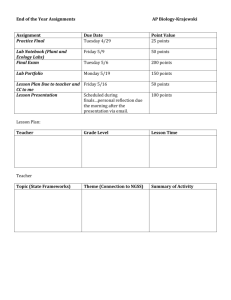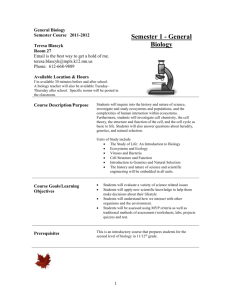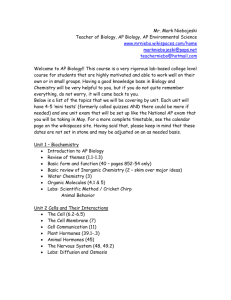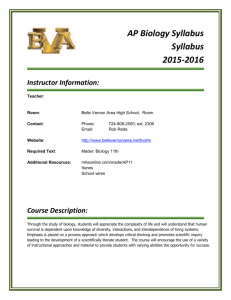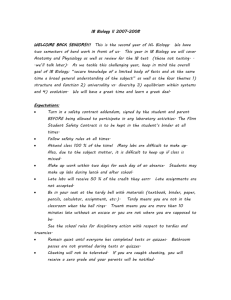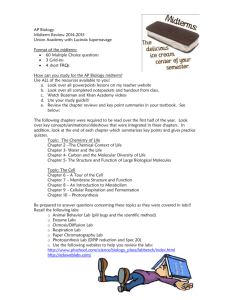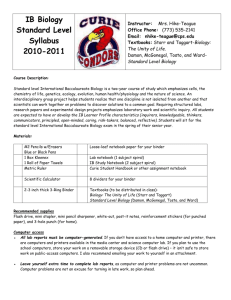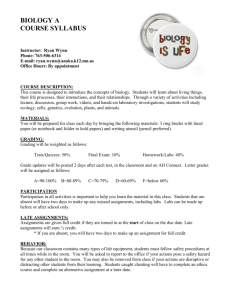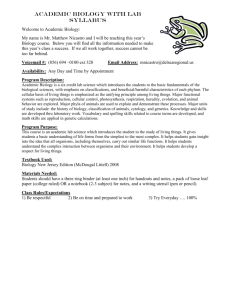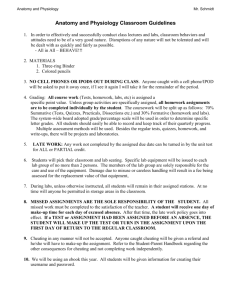Course Syllabus: Biology B - Gull Lake Community Schools
advertisement
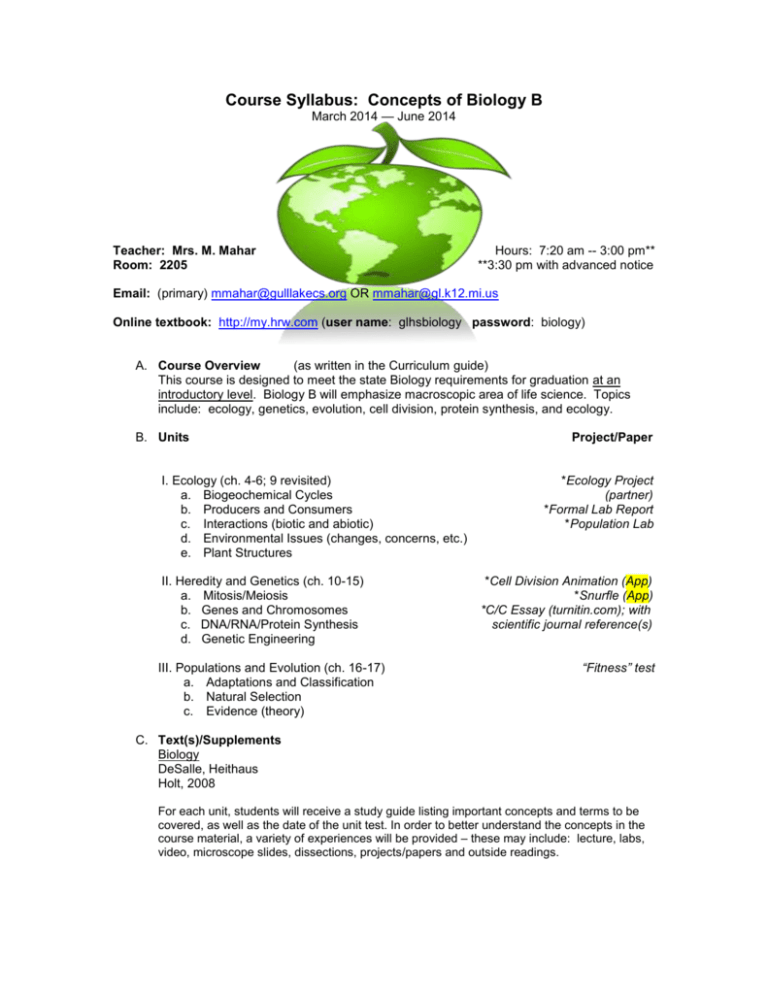
Course Syllabus: Concepts of Biology B March 2014 — June 2014 Teacher: Mrs. M. Mahar Room: 2205 Hours: 7:20 am -- 3:00 pm** **3:30 pm with advanced notice Email: (primary) mmahar@gulllakecs.org OR mmahar@gl.k12.mi.us Online textbook: http://my.hrw.com (user name: glhsbiology password: biology) A. Course Overview (as written in the Curriculum guide) This course is designed to meet the state Biology requirements for graduation at an introductory level. Biology B will emphasize macroscopic area of life science. Topics include: ecology, genetics, evolution, cell division, protein synthesis, and ecology. B. Units I. Ecology (ch. 4-6; 9 revisited) a. Biogeochemical Cycles b. Producers and Consumers c. Interactions (biotic and abiotic) d. Environmental Issues (changes, concerns, etc.) e. Plant Structures II. Heredity and Genetics (ch. 10-15) a. Mitosis/Meiosis b. Genes and Chromosomes c. DNA/RNA/Protein Synthesis d. Genetic Engineering III. Populations and Evolution (ch. 16-17) a. Adaptations and Classification b. Natural Selection c. Evidence (theory) Project/Paper *Ecology Project (partner) *Formal Lab Report *Population Lab *Cell Division Animation (App) *Snurfle (App) *C/C Essay (turnitin.com); with scientific journal reference(s) “Fitness” test C. Text(s)/Supplements Biology DeSalle, Heithaus Holt, 2008 For each unit, students will receive a study guide listing important concepts and terms to be covered, as well as the date of the unit test. In order to better understand the concepts in the course material, a variety of experiences will be provided – these may include: lecture, labs, video, microscope slides, dissections, projects/papers and outside readings. Each student will need a notebook (3 ringed binder is preferred) for notes and assignments. This will help you organize your study materials and prepare for your test. Learning organizational skills is a helpful study tool and is essential in this class. Grades will be based on points accumulated from homework, assignments, quizzes, labs, projects/papers, tests and participation (includes bellringers) – including presentations. You are expected to take notes and read the text book plus any assigned supplemental readings. In many situations you will be “working together” — there is a big difference between working together and COPYING…Copying is CHEATING!!! Any student(s) who even appears to be cheating (decided by the teacher) will receive a zero on that particular assignment/quiz/test. Communication is a big part of science — papers must be on time, spelled correctly and legible to intelligently and effectively communicate your understanding. I am always available for proofreading, suggestions, comments, etc. (it is highly recommended that you take advantage of this opportunity!). Dress code, tardies, cell phones, etc. will be enforced as per handbook. Labs, both in the classroom and in the outdoor classroom, will require close-toed shoes (not flip-flops or sandals). Lab time will be incorporated as appropriate for each unit. Due to the nature of lab set-up, the shelf life of chemicals/specimens, and the time involved in doing the labs – LABS ARE VERY DIFFICULT TO MAKE UP. Make up situations will vary for individual labs and will be required to be completed outside of class time (scheduled with teacher). It is expected that each student participate FULLY in all labs. Most importantly: I AM HERE TO HELP YOU…PLEASE USE THIS AS AN ADVANTAGE: COME IN AFTER SCHOOL TO ASK QUESTIONS, PARTICIPATE IN CLASS, GET HELP DURING SEMINAR!!! D. Grading Procedure As in all classes, all activities related to class are assigned points. Your grade will be based on the percentage of possible points earned. Of the total points approximately 25% - 30 % will be from assignments and quizzes, 25% - 30% will be from labs and projects and the remaining, roughly 50%, will be from tests. The grading scale is as follows: A 100 – 93 A- 92 – 90 B+ 89 – 87 B 86 – 83 B- 82 – 80 C+ 79 – 77 C CD+ D DE 76 – 73 72 – 70 69 – 67 66 – 63 62 – 60 59 – 00 I do NOT automatically round your grades up. I reserve 0.5 % for participation/attitude. I do NOT give A’s or E’s – but you may EARN either. E. Additional Handouts/Info… Student Safety Contract – file in notebook behind procedures *Student Safety Contract (signed by you and you parent) – Due by Friday, March 21st *Student/Parent Agreement (signed by you & parent) – Due by Friday, March 21st Classroom Procedures/Info. – class website Study Skills – class website
